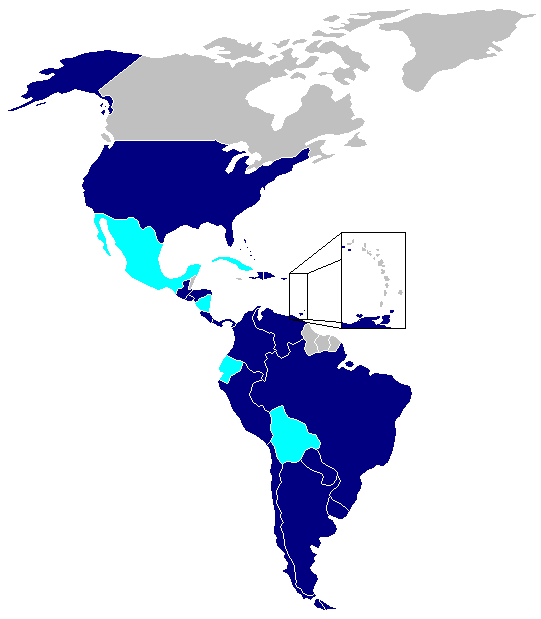Compass World: Uruguay to Withdraw From Rio Treaty
LATIN AMERICA & THE CARIBBEAN
Uruguay to Withdraw From Rio Treaty
Citing an “obvious attempt” by the other signatories to use it to threaten Venezuela with military force, Uruguayan Foreign Minister Rodolfo Nin Novoa said that Uruguay will withdraw from the Inter-American Treaty of Reciprocal Assistance, also known as the Rio Treaty. The treaty considers an attack on one of its members to be an attack on them all. Earlier this week, Colombian President Ivan Duque Marquez proposed that member states invoke the treaty against Venezuela for allegedly harboring Colombian rebel groups. Only Uruguay voted against the resolution, while Trinidad and Tobago abstained. Uruguayan officials had previously said that the country would leave the pact if military action against Venezuela was authorized.
A map, created prior to Uruguay’s withdrawal, showing the member states of the Rio Treaty in dark blue and states that have previously withdrawn from the Rio Treaty in light blue
INDO-ASIA-PACIFIC
Hong Kong Bill Makes It Out of Committee
A bill proposed in support of pro-democracy protests in Hong Kong was approved by committees in both houses of the United States Congress. Known as the Hong Kong Human Rights and Democracy Act, the bill opens the door for sanctions on individuals deemed responsible for “undermining basic freedoms in Hong Kong.” It also allows for the possibility of export controls and limits on technology transfer to Hong Kong. According to the South China Morning Post, Hong Kong enjoys a special customs regime that allows it to independently negotiate trade agreements with the United States. Thus, it has not been subject to the tariffs imposed by the Trump administration on China. A spokesperson for China’s Ministry of Foreign Affairs said it would “hit back forcefully” in response to the bill moving forward.
MIDDLE EAST & CENTRAL ASIA
Netanyahu Asked to Form Next Israeli Government
Following Israel’s general election last week, President Reuven Rivlin has asked incumbent Prime Minister Benjamin Netanyahu to form the next government. Opposition leader Benny Gantz’s party won 33 seats, while Netanyahu’s party won 32. The two were unable to come to terms on a coalition in the 120-seat government, so Netanyahu faces a tough path forward toward consolidating a government and avoiding yet another general election. Gantz says he will not pursue a deal with a leader “facing a severe indictment.” A hearing is set to take place next week regarding corruption charges against Netanyahu. Meanwhile, the bloc of parties that came third in the election wants Netanyahu removed from power.
EASTERN EUROPE & RUSSIA
IMF Confirms Bulgarian Economist as Managing Director
Bulgarian economist Kristalina Georgieva was confirmed as the International Monetary Fund’s (IMF) new managing director on September 25. She became the first managing director in the institution’s history to come from an emerging market. Raised under Communism in Bulgaria, the economist led a career at the World Bank and European Commission as an advocate for gender equality and a leader in the fight against climate change. Georgieva received support from much of the European Union, as well as tacit support from the United States. The new managing director will face several challenges, including a global economic slowdown and historic levels of debt.
AFRICA
Algeria’s Military Announces Numerous Convictions
Algeria sentenced its former spy chief, Mohamad Mediene, and two other prominent figures from the ousted government of former-President Abdelaziz Bouteflika (pictured) as the military seeks to end protests against Algeria’s political elite ahead of a December 12 election. A military court issued 15-year sentences to the spy chief, as well as Bouteflika-aligned former politicians and businessmen on charges of conspiring “against the army” and “the authority of the state.” The convictions have made the army a major force heading into the Algerian election. Protestors are demanding the military withdraw from politics and remove Bouteflika allies to ensure a fair election.
WESTERN EUROPE & CANADA
PSOE Sees Support Increase in Latest Poll
A recent poll conducted in Spain indicates increasing support among voters for Spain’s Socialist Party (PSOE). According to the poll carried out by the CIS public research institute, roughly 34 percent of voters support PSOE, which is five points higher than the share of the vote secured by PSOE leader and current Prime Minister Pedro Sanchez during the inconclusive April 28 general election. The poll also found support for the conservative Popular Party to be just over 17 percent. Earlier this year, the PSOE was unsuccessful in forming a government with its ideological allies. As a result, another round of elections are scheduled to take place on November 10, the fourth vote in as many years. The poll also revealed growing resentment among voters toward politicians, as the percentage of people who say politicians are among the country’s biggest problems rose by seven points in just two months.
Writing contributed by Adam Hilelly, Ben Richmond, and Benjamin Barth.







